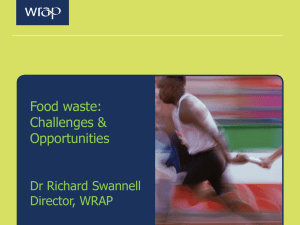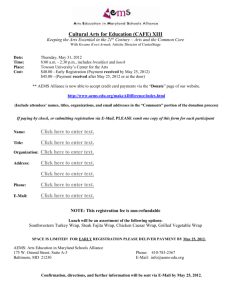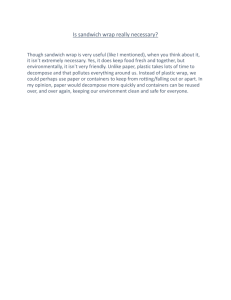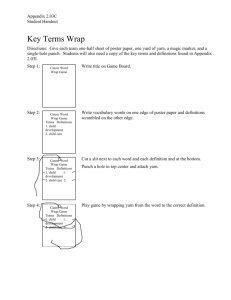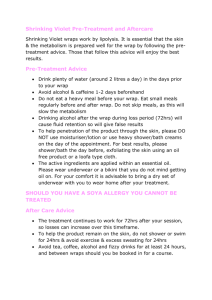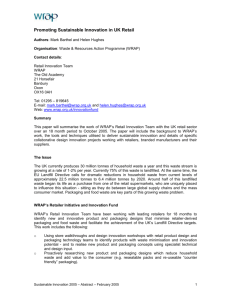Executive Summary
advertisement
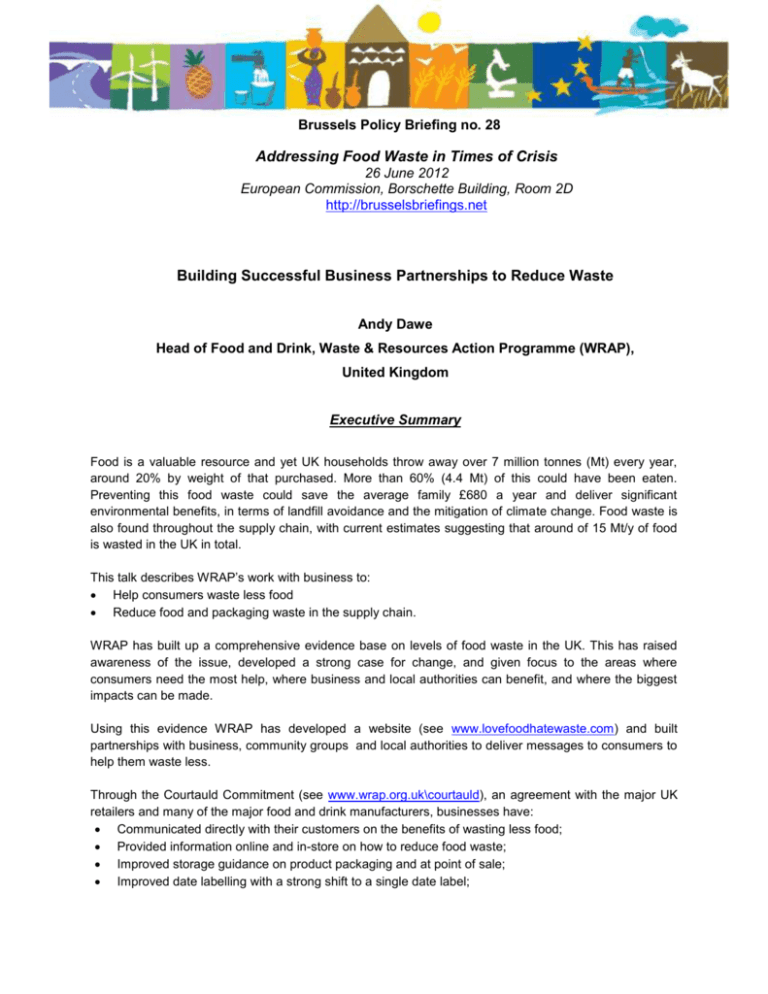
Brussels Policy Briefing no. 28 Addressing Food Waste in Times of Crisis 26 June 2012 European Commission, Borschette Building, Room 2D http://brusselsbriefings.net Building Successful Business Partnerships to Reduce Waste Andy Dawe Head of Food and Drink, Waste & Resources Action Programme (WRAP), United Kingdom Executive Summary Food is a valuable resource and yet UK households throw away over 7 million tonnes (Mt) every year, around 20% by weight of that purchased. More than 60% (4.4 Mt) of this could have been eaten. Preventing this food waste could save the average family £680 a year and deliver significant environmental benefits, in terms of landfill avoidance and the mitigation of climate change. Food waste is also found throughout the supply chain, with current estimates suggesting that around of 15 Mt/y of food is wasted in the UK in total. This talk describes WRAP’s work with business to: Help consumers waste less food Reduce food and packaging waste in the supply chain. WRAP has built up a comprehensive evidence base on levels of food waste in the UK. This has raised awareness of the issue, developed a strong case for change, and given focus to the areas where consumers need the most help, where business and local authorities can benefit, and where the biggest impacts can be made. Using this evidence WRAP has developed a website (see www.lovefoodhatewaste.com) and built partnerships with business, community groups and local authorities to deliver messages to consumers to help them waste less. Through the Courtauld Commitment (see www.wrap.org.uk\courtauld), an agreement with the major UK retailers and many of the major food and drink manufacturers, businesses have: Communicated directly with their customers on the benefits of wasting less food; Provided information online and in-store on how to reduce food waste; Improved storage guidance on product packaging and at point of sale; Improved date labelling with a strong shift to a single date label; Developed messages to help consumers take full advantage of products on offer; and, Introduced packaging improvements to help consumers waste less. More than 300 local authorities are also running Love Food Hate Waste initiatives that help local residents waste less food including: direct communications, road shows, cookery demonstrations and recipe competitions. Since 2006/7, millions of people have thrown away less food, saving many hundreds of pounds for their household. Key achievements include: Reduced food waste arisings by over 1.1Mt/y (an 13% reduction), preventing over £2.5 billion worth of food a year being wasted and meaning on average every household in the UK not having to spend £100 a year on food bought but thrown away; Avoided 3.6 Mt/y of CO2 (equivalent) emissions and a billion litres of water associated with wasted food; Helped more than 2 million people to make changes to the way they shop, prepare, store and use food, to avoid waste; and, Helped Local Authorities save around £80 million in avoided waste costs. While this work is unlikely to be the only cause of household food waste reduction, it is highly likely to have been a major contributory factor. Next steps are to deliver more household food waste reduction, to reduce food and packaging waste in the supply chain through the Courtauld Commitment, and in the hospitality sector through a new voluntary agreement to be launched in June 2012 (see www.wrap.org.uk/hospitality). More information 1. New estimates for household food and drink waste in the UK (WRAP, 2011): http://www.wrap.org.uk/content/new-estimates-household-food-and-drink-waste-uk 2. Household Food and Drink Waste in the UK (WRAP, 2009): http://www.wrap.org.uk/content/report-household-food-and-drink-waste-uk 3. Details of the new hospitality and food service agreement: http://www.wrap.org.uk/content/hospitality-and-food-service-wraps-work-0 4. Summary of related research on food waste: http://www.wrap.org.uk/content/research-andreports-handy-summaries-grocery-sector

